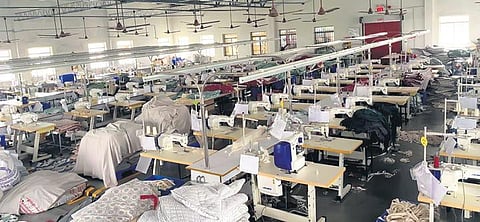

TIRUPPUR: Textile industries, including export and local manufacturing, weaving and knitting, dyeing and stitching units in Tirupur, Erode and Karur districts that employ over 10 lakh people, began a two-day strike on Monday condemning the increase in price of yarn and cotton.
In Tiruppur, several associations including the Dyers Association of Tiruppur, Tiruppur Exporters Association, Tiruppur Exporters and Manufacturers Association are taking part in the strike. Over 3,000 garment and export units did not function.
Federation of garment unit owners association president MP Muthurathinam said, “For the past four months, garment units are affected because of the yarn price hike. We are unable to renegotiate deals with buyers from foreign countries. So, the union government should enforce an immediate ban on the export of cotton and cotton yarn. Further, cotton should be brought under essential commodities list.”
Over 10,000 shops, bleaching, processing and dyeing units across Erode remained closed. Erode Cloth Merchants Association President V Kalaiselvan told TNIE, “The industry is on the decline for the past 18 months. The price of 40 counts yarn has doubled from Rs 200; 30’s yarn from Rs 170 to Rs 330; and 20’s, Rs 140 to Rs 260.”
In Salem, yarn traders staged a strike on Monday and over 500 shops in the district remained closed. Salem District Yarn Merchants Association president Saravanan said the Centre should ban export of cotton. On Monday, a meeting was conducted by Tamil Nadu Fabrics Manufacturers Association with nine organisations. Association president A Alagarasan said all raw material used in textile sector should be brought under the essential commodities list. In Karur, 400 export units and 400 domestic players, yarn traders, dyeing print units and stitching units are participating in the strike.
P Gopalakrishnan, President of The Karur Textile Manufacturer Exporters’ Association said that since the 2nd quarter of 2021, the Karur cluster is facing a lot of challenges due to abnormal price hike, “When mills are running at full capacity, we doubt if they are artificially creating demand to increase prices. We are unable to book new orders from overseas customers and not able to execute already booked orders due to price fluctuation,” he said.
(With inputs from Salem, Erode & Karur)